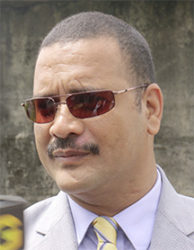Minister of State Joseph Harmon yesterday refused to comment on the future of James Singh as head of the Customs Anti-Narcotics Unit (CANU), following the recent completion of the inquiry into the unit’s role in the interception and subsequent release of a cocaine laden vessel.
At a post-Cabinet press conference yesterday, Harmon would not confirm or deny if the report from the inquiry recommended that Singh be removed from office. “Again, don’t let me speculate about likeliness or likelihood of things… I cannot confirm that…this deny and confirm business, I would not confirm it,” he told reporters at the Ministry of the Presidency.
On February 16th, four Guyanese men were intercepted by members of the US and Trinidad and Tobago coastguards in a boat in international waters, about 70 nautical miles north of Suriname, with over four tonnes of cocaine, estimated at a street value of overUS$71.7M aboard the vessel.

After the bust was made public, Singh had told Stabroek News that the vessel was last in Guyana in 2013. Singh was subsequently asked to proceed on accumulated leave and on March 31st, a Commission of Inquiry (CoI) was set up to inquire into the circumstances surrounding the entry into, the interception, detention and subsequent release of an unnamed private maritime vessel in the sea space of the territory of Guyana. Its terms of reference included looking at the instructions issued to the Guyana Defence Force Coast Guard, the CANU and the role of any foreign law enforcement agencies in the conduct of the operation to intercept, detain and search the said vessel, and if the operation to intercept, detain and search the said vessel was approved by any superior authority in Guyana.
The government had said that there was no link between Singh proceeding on leave and the probe.
Harmon yesterday was unable to say when Singh is scheduled to return to work. “I think his leave is sanctioned by the Minister of Public Security and that is where it is right now,” he said.
‘Change’
Harmon noted that the CoI looked at personnel, the passage of information and several issues which affect the way the country deals with counter-narcotics operations. “I believe already while the recommendations have not all been acknowledged and acted upon, that some of these things have already started to take hold and you would recognise the increased levels of detection of narcotic operations in Guyana, seizures in Guyana based on good intelligence and follow up to that intelligence work. We no longer just hearing that drugs left Guyana and was found somewhere else,” he said.
Harmon added that when the next United States State Department report on drug trafficking comes out next year, “they will have clearly defined actions which were taken by this government. I want to say that the last report which was produced by the US State Department is a very positive report about Guyana. They said that the government is not involved in any way in these corrupt practices as it relates to narcotics…they have also identified that we need to take some other steps in other areas, which we have already started taking so that the report would have already been overtaken by events which are taking place now with the establishment of the National Anti-Narcotics Agency.”
With regards to personnel, he said, “there is definitely going to be some adjustments, some changes in the fight-against-narcotics’ architecture. There is going to be some changes and the report, I believe, is pointing in that direction.”
Pressed for details regarding the recommendations made, he indicated that the report was handed over two days prior and President David Granger has to be given an opportunity to read it. Once that happens, “then certainly you will be told,” he added.
Brigadier (Retired) Bruce Lovell headed the CoI, with former Assistant Commissioner of Police Winston Cosbert and Christine Bailey also serving as commissioners.
Brigadier Lovell, in an invited comment at the handing over of the report on the CoI’s findings, had said that “Inquiries do what any good journalist would do and that is to answer the Five W’s and the one H; the Who, the What, the Where, the Why and the When and it also goes a bit further and seeks to recommend what should be done to prevent any further occurrence. So this inquiry has done just that. In our recommendations we look at a number of systematic issues, doctrine, organisation, training, leadership, personnel, facilities and, of course, policies.”








